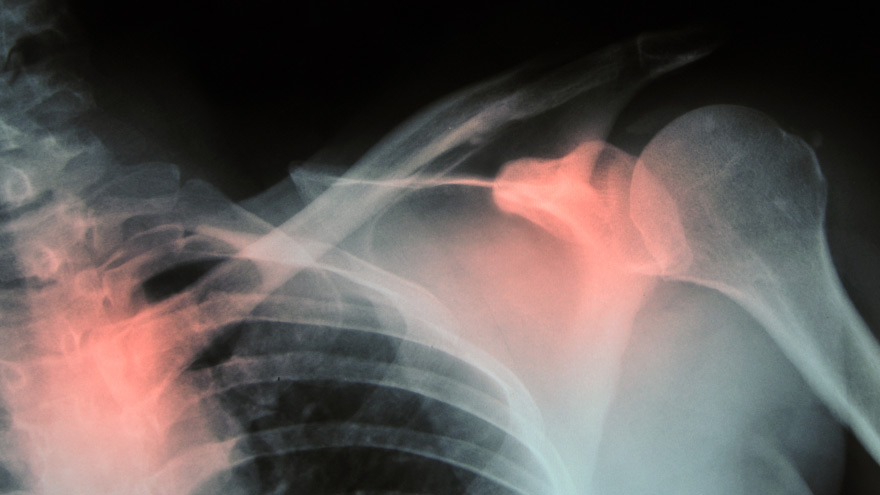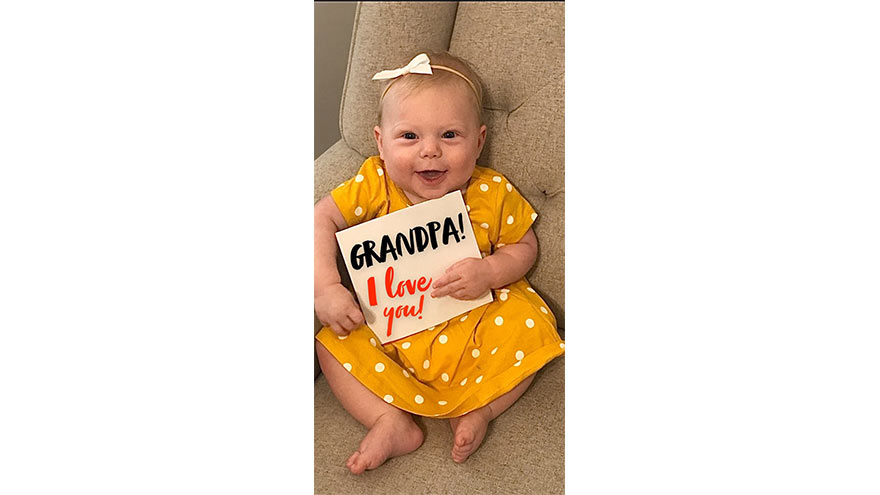Search
-
Prevent Osteoporosis: Take Control of Your Bone Health Today
Some risk factors associated with osteoporosis are out of your control. But you’re in luck, because some can be lessened by following simple tips. Below, Orthopedic Nursing Manager Katie McCarthy discusses the signs, symptoms and preventive measures. By Katie McCarthy, BSN, RN, ONC, Orthopedic Nursing Manager, Renown Health Osteoporosis is often called the silent disease, because it develops gradually for years with no clear signs or symptoms. And while some bone loss is expected as we age, osteoporosis is not a normal part of aging. So it’s important to start thinking about your bone health early. Bone is not just a lifeless scaffold for the body. It is living tissue that regenerates continually. Once we reach peak bone mass around age 25, we begin losing more bone than we produce, increasing the risk of developing osteoporosis — which literally means porous bone and points to a loss in bone density. In severe cases, normal everyday activities or movements, like hugging, can cause a fracture. After the first fracture you’re at higher risk for more, which can lead to a life of chronic pain and immobility. Bone fractures in the spine or hip are the most serious. Hip fractures can result in disability and even death — especially in older adults. Spinal fractures can even occur without falling. The vertebrae weaken to the point that they simply crumple, which can result in back pain, lost height and a hunched-forward posture. Osteoporosis: Uncontrollable Risk Factors Women are at greater risk of developing osteoporosis than men, and white and Asian women are at higher risk than black and Hispanic women. Other uncontrollable risk factors include: age; a family history of osteoporosis; certain genetic conditions; medications and medical treatments; eating disorders; a low body weight and small, thin frame; ethnicity; menopause: In fact, the lack of estrogen produced during menopause is largely responsible for a woman’s increased risk. Poor diet, tobacco use, excessive alcohol consumption, lack of exercise and an unhealthy weight also contribute to bone loss. Fortunately, those risk factors are in your control. Without symptoms, you can’t know if you’ve developed osteoporosis unless you get a bone density test or suffer a fracture. If you fall into a high-risk group, are over age 50 or have any concerns about your bone health, consult your doctor and find out if you need to be evaluated. Additionally, if either of your parents sustained hip fractures, you experienced early menopause or took corticosteroids for several months — a steroid often prescribed to relieve inflammation and arthritis — you’ll want to talk to your doctor about your bone health. If you test positive, your doctor will devise a treatment plan to match your needs, which will include lifestyle changes surrounding diet and exercise to build and strengthen weak bones. Medication to slow bone breakdown and build new bone may be prescribed, depending on the severity of your bone loss. If you’ve sustained a spinal fracture that is causing severe pain, deformity or is not responding to non-surgical treatment, your doctor may recommend surgery. Reduce Your Risk of Osteoporosis You can strengthen your bones now to prevent osteoporosis from starting. Here are some tips: Eat a diet rich in fruits and vegetables and low in caffeine, sodium and protein. Avoid soda, and talk to your doctor to make sure you’re getting enough calcium and vitamin D. Don’t smoke — it directly correlates with a decrease in bone mass. Smokers also take longer to heal from a fracture. Limit alcohol to two to three beverages per day. It interferes with the production of vitamins needed to absorb calcium and the hormones that help protect bones. Exercise three to four times each week — it’s key to healthy bones. Weight-bearing exercises like jogging, hiking and especially weight lifting build bone mass and density. There are aspects of the aging process we can’t control, but we can do something about bone loss and osteoporosis. Find out your risk, and show your bones a little TLC — you’re going to need them. This story was also published in the Reno Gazette-Journal’s Health Source on April 24, 2016.
Read More About Prevent Osteoporosis: Take Control of Your Bone Health Today
-
CEO Blog: Improving Health Through Genetics and Big Data
Renown Health President and CEO Tony Slonim, MD, DrPH, discusses efforts nationwide to develop a more effective and efficient way to deliver care. explains the benefits of Renown Health’s population health study with the Desert Research Institute and 23andMe.
Read More About CEO Blog: Improving Health Through Genetics and Big Data
-
What is a High-Risk Pregnancy?
You can still have a healthy pregnancy and baby if your pregnancy is high-risk. Learn what steps you can take to give your baby the best start possible. A “high-risk” pregnancy is one that threatens the health or life of the mother or her fetus. Women with high-risk pregnancies should receive care health care specialists to ensure the best possible outcomes. Some examples of a high-risk pregnancy include: Maternal age, women 35 and higher or 17 and younger Lifestyle choices, including smoking, drinking alcohol and illegal controlled substances Existing medical history, chronic hypertension, diabetes and breathing issues Multiple gestation, pregnancy with twins or triplets Overweight and underweight Remember: You can still have a healthy pregnancy and baby if your pregnancy is high-risk. Some ways to promote a healthy pregnancy: Schedule an appointment with your OBGYN Eat a balanced diet Avoid substances Prenatal care Healthy weight gain Reduce stress Exercise Pregnancy & Childbirth at Renown | 775-982-KIDS (5437) When you are expecting a new baby, you can depend on Renown Children’s Hospital for all your mom and baby healthcare needs. We can help you find the right doctor and tell you what to expect during your stay. We offer childbirth education classes and tours to help you prepare. Be sure to check out our virtual tours of our Labor Assessment Area.
-
You're Ready to Start a Family! Now What?
Deciding you’re ready to start a family is a big decision for any couple. So once you’ve decided – what are the next steps for both moms and dads-to-be? And what should you know if you’re struggling to conceive? Dr. Myron Bethel, OB/GYN with Renown Women’s Health, offers key insights about fertility. What’s the first thing couples should do when they decide to start a family? For the mom-to-be, it’s important to meet with your obstetrician before you get pregnant. This appointment gives you an opportunity to discuss your family medical history, any past or current health problems, immunization history, medications you’re taking and any issues with previous pregnancies. Your doctor can also provide helpful tips to ensure your body is ready for a healthy pregnancy and help guide you on how to monitor your period, basal resting body temperature and other important factors to help you get pregnant more quickly. How can couples who are trying to get pregnant make sure they’re healthy to conceive? Of course it’s important to maintain a healthy lifestyle all the time, but it’s especially important if you’re trying to get pregnant. There’s no magic pill or single food, but women should start focusing on nutrients they’ll need during pregnancy. Before trying to conceive, start taking folate and folic acid to help prevent birth defects. You can get good sources of these nutrients from cereal, spinach, beans, asparagus, oranges and peanuts. Lifestyle changes can also help improve fertility. For both men and women, extra weight can reduce fertility. Both sexes can increase their chances of conception by not smoking, not drinking alcohol and exercising regularly. And for men specifically, take a daily vitamin containing zinc and selenium to support healthy sperm. What is the average timeline for conception, and what do you suggest for couples who may be struggling to conceive and start a family? First, remember getting pregnant can take longer than you expect. Do not to get stressed out about it or place blame. Seventy percent of couples conceive within six months and 85 percent within one year of trying to get pregnant. To help improve your chances of pregnancy, monitor your ovulation closely. You can do this by tracking your period, watching your body closely and logging symptoms, logging your basal body temperature or using ovulation kits. If you still aren’t sure when you’re ovulating, try to have sex every other day to improve your chances of conception. If you’ve been trying for nine months to a year, you can talk to your OB about options and discuss meeting with a fertility specialist.
-
A True Joint Effort: Exercises to Prevent Knee Pain
Experiencing knee pain during exercise or while undertaking daily activities? The knee is the largest joint in our body, so it goes without saying a lot hinges on its functionality. Here are a few exercises to help. Is exercise a real pain in the knee for you? Does getting up in the morning require a few minutes for your knees to adjust to walking around? As it turns out, knee pain is common, and it can result from injury, overuse or the breakdown of cartilage over time. Often, this pain is a result of faulty mechanics in your body, according to Jessica Ryder, a physical therapist with Renown Physical Therapy and Rehab. “We see weakness at the hips causing a lot of stresses at the knee,” she says. Exercises that Alleviate Knee Pain Try these three exercise to strengthen your glute muscles and maintain proper alignment in your knees. Hip Lift Lie flat on your back with your knees bent and feet flat against the floor. Lift your hips into the air until your body is in a neutral position, then lower your hips back down. Repeat this motion several times until you feel a gentle burn in your glute muscles. Step Down Stand with one foot on a stair or step. Slowly bend your knee and drop the other foot toward the floor. Slowly extend back up to your starting position. While doing this exercise, it’s important to move slowly, maintain control and ensure that your knee is in line with your toes. Do as many reps as needed until you feel a small fatigue in your muscles. Repeat this exercise on the opposite leg. Side Step with Exercise Band Place an exercise band around your ankles. Stand in a slight squat and then take several steps to the side until you feel a small fatigue on the outside of your hips. While doing this exercise, keep your upper body still and focus the exercise to your hips. The band will try to move your knees toward each other Repeat in both directions. Hometown Health and Renown Health are proud to be the official insurance plan and healthcare partners of the Nevada Wolf Pack. Renown Physical Therapy and Rehab | 775-982-5001 Through outpatient physical, occupational and also speech therapy, Renown Physical Therapy and Rehab gives patients hands-on, individualized treatment. Our therapists use evidence-based methods to help patients return to an active, productive lifestyle. Learn More About PT
Read More About A True Joint Effort: Exercises to Prevent Knee Pain
-
Two Dads and a Newborn Adoption: "Our Experience Was Wonderful"
Watch as two dads look back on their newborn adoption process. They reminisce about discovering their newborn was on his way — and how Renown Health subsequently helped them navigate the process. During Memorial Day weekend, Chris Mulhern and his husband, Jeffrey Bodimer, learned a set of birth parents chose them to parent their unborn baby boy. After writing a letter to the birth parents, they were chosen over other applicants in a private adoption. The adoption agency took care of many details, like connecting Mulhern and Bodimer to the birth mother and dad. In fact, they could participate in nearly all the phases of the pregnancy. The mother's prenatal care and delivery took place at Renown Health, where Mulhern and Bodimer attended her appointments and took childbirth classes. "Our experience was wonderful at Renown," says Mulhern. "We thought it was absolutely incredible how nice and accepting everyone was." The Nuances of Newborn Adoption Their son, Bradley, was born via cesarean section. And the adoptive parents got to see him an hour after he came into the world. The labor and delivery nurses even helped coordinate everything between them and the birth mom. Mulhern and Bodimer stayed in a room at The Inn at Renown. The closeness of the facility on the Renown campus made it possible to feed Bradley every two hours. Incredible Nurses "They were great, the nursing staff. If we weren't sure about doing something right, about burping him right they would say 'It's okay. He's not going to blow up. He will eventually do it'," says Mulhern. The nurses also made arrangements for the two dads to participate in skin-to-skin contact with their newborn baby. Experts agree parents and babies should be in direct contact for at least the first 1–2 hours after the birth. Taking Baby Home Chris and Jeffery took Bradley home after three days at Renown. “It was the most joyful thing to be chosen as his parents, even before we met him,” says Chris.
Read More About Two Dads and a Newborn Adoption: "Our Experience Was Wonderful"
-
Why Didn't You Tell Me? 10 Pregnancy Surprises, Revealed
We asked, you answered: Moms and dads who have been there, done that offer up 10 pregnancy surprises. These are the things they wish they knew before, during and after their pregnancy. Check out these real examples of insights that would have proved helpful and enlightening to these parents and parents-to-be. When you’re pregnant or considering becoming pregnant, it seems the unsolicited advice runs rampant. You’ll hear people tell you what kind of Boppy Pillow to buy. You’ll have people tell you that you should “definitely” have a natural birth or a pool birth or a doula or a therapy dog present. And you’ll definitely hear about what kinds of foods to induce labor, what kind of tea to drink to reduce nausea during your pregnancy and what kind of underwear for less “chafing.” But something you might not hear as often: Some of the symptoms and side effects, both before and after giving birth, that were totally unexpected. These are the ultimate pregnancy surprises. So we asked the question of moms and dads who have been there, done that: What do you wish you had known would happen during your pregnancy — you know, during the time you were supposed to be all sweet and beautiful and glowing? Here is Part 1, featuring 10 real-life, crowdsourced pregnancy surprises from parents. And yes, there are multiple parts to this post, because people are passionate about sharing their wisdom! We’ll publish the second part later this month. Pregnancy surprises: What do you wish you had known about pregnancy? “The only symptom I never heard anyone talk about is extra blood flow making me feel all sorts of weird feelings in my head. I feel like I’m in a dream half the time. I looked it up online when it started happening, and tons of women have the same symptom.” — Anna K. “For me it was an after-birth surprise. I had no clue your tummy doesn’t just spring back to where it was pre-pregnancy. It was a rude awakening in the hospital when I had to have my husband go home and get a pair of maternity sweatpants to get dressed to go home in. I’d hoped to dress in my old cute jeans…. nope!” — Suzanne M. “I didn’t know that while you’re pregnant, friends and strangers would tell you their nightmare delivery stories. Oh — and that complete strangers will, uninvited, touch your baby bump. I didn’t know that you’re in the safety zone while pregnant and that men and women openly adore you. I didn’t know that besides the mother, the nurses do most of the work. I didn’t know that even though they’ve obviously seen hundreds of deliveries, nurses and doctors cry too once your baby is out. I didn’t know even though I thought they must be crazy to send a tiny human home with me, that you instinctively know how to parent. I didn’t know what it meant to love something more than myself and how that changes everything.” — Cathy B. “I had no idea the weird things that it does to hair. My bangs stuck straight out for months, and I just had to go with it. There wasn’t enough product that would make them lie down.” — Heidi P. “That you may not go home with your child if there are any complications. That was a sad day. But 22 years later, we are blessed, because everything turned out fine.” — Kristine F. “I didn’t know people would opine out loud to you, that you must not have purposely gotten pregnant with Baby #2 or 3, etc., implying you failed basic high school biology and that you should have known better than to have more than one kid.” — Jessica L. “I didn’t know that near the pregnancy’s end, as the hips widen, that those bones could begin to separate. I was sore and achy. And I wish I’d slowed down and rested more in the last few weeks.” — April C. “I had heard about food cravings, but no one told me food aversions were also a thing. I bought a whole load of groceries for the week, and by the time I got home, I suddenly couldn’t even look at the ground turkey (that’s not an exaggeration), let alone cook it and eat it. I didn’t throw up necessarily, but my body told me to avoid most meats and vegetables. I pretty much lived on plain bagels and cereal for half my pregnancy.” — Danielle S. “Morning sickness is SO not just in the morning! All-the-time sickness is what I experienced. And why didn’t anyone warn me about butthole pain during and after birth?” — Stephanie C. “The juiciness. Every possible secretion was in hyper drive.” — Jane F. Giving Birth at Renown At Renown Regional Medical Center we have the skill, expertise and technology — along with a friendly environment — to make your experience a memorable one. Pre-register for childbirth, take virtual tours of our rooms and facilities, and learn more about our labor and delivery offerings at the link below. Explore Our Services
Read More About Why Didn't You Tell Me? 10 Pregnancy Surprises, Revealed
-
Get Ready for Baby with Childbirth Classes
By taking our pregnancy and birth class, you will gain the tools necessary to have a safe and empowering birth experience for both you and your baby. Chris Marlo, Childbirth Educator at Renown Health explains why birth classes are important. For questions regarding classes or tours, contact Chris Marlo: chris.marlo@renown.org 775-982-4352 What is a Certified Childbirth Educator/Doula? If you are expecting a baby, Renown has a wide variety of classes to help prepare you for birth. Classes are taught by certified childbirth educators and doulas. A certified childbirth educator is a trusted resource who has a passion for educating expecting parents about childbirth, and will provide you with non-biased, evidence-based information. A doula is a professional labor assistant who provides physical and emotional support during pregnancy, childbirth and postpartum. As you prepare for birth, our certified educators will guide you each step of the way and ensure you receive the quality care you deserve. Why Should I Take Pregnancy and Birth Classes? For expecting parents, taking a childbirth education course is an important step in preparing for their new arrival. We cover topics such as labor and delivery, postpartum care, breastfeeding, nutrition, pain management techniques, and more. Our experienced instructors will provide you with the information you need to make informed decisions during your pregnancy and childbirth. With our classes, you can be sure that you have all the knowledge necessary to have a positive experience before, during, and after your baby’s arrival. Our classes will help ease your fears as we practice breathing, relaxation and the many tools you can utilize for birth. At Renown we understand that there is no right way to give birth, and our educators will offer a supportive environment where questions are encouraged, and everyone is respected. Childbirth Class Options: Baby and Family Suites Tour & Virtual Tour Breastfeeding Basics and Beyond Class Breathing & Relaxation Techniques for Birth Pregnancy and Birth – 5 & 7 Week Series Pregnancy and Birth Class Additional Resources: Baby Safe Class Babysitter Class Grandparents Virtual Class Infant CPR & Choking Class Newborn Care Nurturing Your Newborn Preparing for Postpartum Virtual Class
-
Renown Health Vision for Value Based Care
In recent years, healthcare has undergone many important transitions. One of the greatest changes has been the transition from a fee-for-service model to a value-based care model. Historically, healthcare organizations were paid for the amount of services they performed. This payment model resulted in more tests and procedures ordered, which, in turn, increased our country’s health care costs. However, now our government incentivizes health systems to provide the highest quality of care at the lowest cost possible. This new payment model is called value-based purchasing or value-based care. In this model, providers focus on delivering more coordinated and effective care. Additionally, healthcare organizations track important metrics like patient engagement, population health, and hospital readmissions. At Renown Health, we know that progress on these metrics represents real improvements in our patients’ lives. Shifting Focus from Illness to Wellness Healthcare organizations have traditionally viewed a hospital stay as the center of a patient’s wellness journey. At Renown Health, we believe a key part of our job is to help people live well every day. This means we focus not only on treating illness and injury but also on prevention efforts to keep people out of the hospital. For example, our employees help patients hazard-proof their homes to prevent falls, as falls are the leading cause of injuries in older adults. We also provide affordable health screenings to catch disease in its early stages, when it is more treatable. Renown Health also recognizes that many of the diseases our patients face – from diabetes to cancer – have social and environmental origins. We know that creating a healthier community will have a positive impact on their physical and mental health. Renown Health partners with local organizations to address community-based issues like addiction, pedestrian safety, air and water quality, climate change, and nutrition. Working together, we can lower the number of people who need care and improve the health and wellbeing of our community. Creating healthier environments and communities will help us prevent disease, which in turn will help us decrease spending and improve health. Most importantly, it will help people live up to their full potential. Dr. Slonim on Twitter | @RenownCEOTonyMD Interested in hearing more of Dr. Slomin’s thoughts on health and healthcare? Engage with him on Twitter. Follow Tony
-
My Inspiration to Keep Fighting Becoming a Grandparent
As a clinician and a cancer survivor, I know that hope is an essential force that drives people to work through difficult situations. I also believe there’s a strong correlation between hope and wellness. Hope inspires us to make healthy choices today with the understanding that these behaviors will benefit us in the future. In addition, an optimistic outlook helps patients face illness and injury with strength and confidence. While it’s easy for some people to maintain a positive outlook, it’s common to feel hopeless on a bad day. An important part of our job as healthcare providers is to help patients cultivate hope and build a strong foundation that carries them through their medical journey. The Importance of Family A common source of hope, for me and many others, is family. My family has recently welcomed our newest member, my first granddaughter, Emory. Becoming a grandparent has inspired me to reflect on the many blessings in my life. It’s not only been a opportunity to reflect, but also look ahead to the future. I often dream about the things Emory will accomplish one day, the kind of person she will become, and the world I want her to live in. These aspirations have renewed my determination to work hard and lead by example. At Renown Health, we know that hope and resilience are just as important in the recovery process as excellent medical care. That’s why we work with our patients to find sources of strength and inspiration in their own lives. We’re committed to helping our patients keep fighting the good fight for a healthier tomorrow.
Read More About My Inspiration to Keep Fighting Becoming a Grandparent
-
Beyond Jello A Healthier Approach to Hospital Food
Hospital food gets a bad rap and maybe it’s deserved. However, at Renown Health we strive to serve patients, visitors and staff meals that are both nutritious and delicious. In this video and blog post, Renown Health President and CEO, Tony Slonim, M.D., Dr.PH., FACHE, shares his thoughts on hospital food and modeling healthy lifestyles. Everyone knows that what we eat matters for almost every aspect of our health. Eating well can prevent chronic disease, control weight, improve our mood and even strengthen our bonds with loved ones as we come together to enjoy a family meal. Yet despite this knowledge, balancing work or school responsibilities, family life and everything in between can make eating healthy feel like an uphill battle. Recognizing this challenge, Renown Health invests in programming to help our community embrace healthy lifestyle habits – starting with our own employees. Knowing that people often look to their healthcare providers to model healthy behavior, we are deliberate in our efforts to help our employees and their families live well. We also provide healthy dining options in our on-campus restaurants and through our food and nutrition services team. We believe that providing nutritious, appetizing meals helps patients to recuperate from illness or injury, helps their families recharge, and helps our staff fulfill their promise of providing outstanding care. We hope that by serving as models of healthy behaviors, our employees will inspire others to join us in this journey. Dr. Slonim on Twitter | @RenownCEOTonyMD Interested in learning more of Dr. Slomin’s thoughts on health and healthcare? Engage with him on Twitter. Follow Tony
Read More About Beyond Jello A Healthier Approach to Hospital Food
-
Making Patient Safety the Priority It Deserves to Be
I am regularly amazed by medical advancements and innovation in the United States. However, even as we make significant progress in many areas of medicine, there is still much more work to be done in others. One such area is patient safety. What is Patient Safety? When we talk about patient safety, we are discussing how hospitals and healthcare organizations protect patients from errors, injuries and infections. Anyone can make a mistake at work, but in healthcare these mistakes can result in serious outcomes. In 1999, the Institute of Medicine released a report that estimated 98,000 deaths per year result from medical examination or treatment. The most recent study in 2013 suggested these numbers could range from 210,000 to 440,000 deaths per year. Many of these deaths result from preventable medical errors. This is inexcusable and shows how much more work our industry still needs to do to improve patient safety. Making Patient Safety a Priority Patient Safety is our number one priority at Renown Health. We dedicate a lot of time to establishing, reviewing, and revising our processes to prevent errors. Despite the obvious importance of patient safety, this issue is largely left to individual hospitals and health systems to manage. There is a surprising lack of national attention around this truly important issue. However, a silver lining of the COVID-19 pandemic is that it is igniting interest in hygiene and infection prevention. Patients want to learn more about the processes that are in place to prevent the spread of infections. In addition to the many protocols that guide our treatment of injuries and illness, Renown Health has implemented the following measures to prevent the spread of communicable diseases: Requiring everyone entering Renown sites to wear a mask or face covering. Establishing new processes to help patients and visitors practice social distancing. Limiting the number of visitors in our facilities. Screening all employees and patients for symptoms. Enhancing our already-thorough cleaning and disinfection processes. I hope patient safety and infection prevention remain in the national spotlight long after the COVID-19 pandemic has ended. The healthcare industry must come together to develop stronger systems and regulations to minimize preventable medical errors. We have a responsibility to our patients to do better.
Read More About Making Patient Safety the Priority It Deserves to Be











